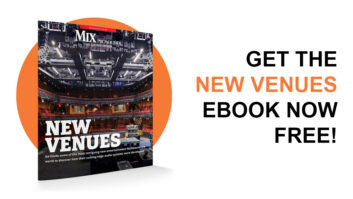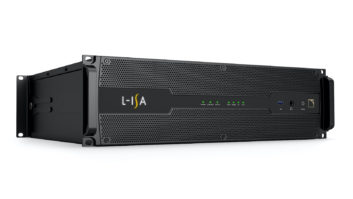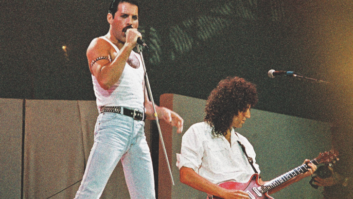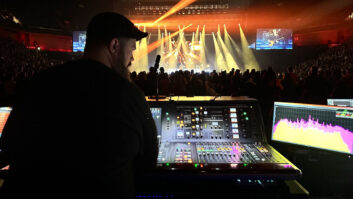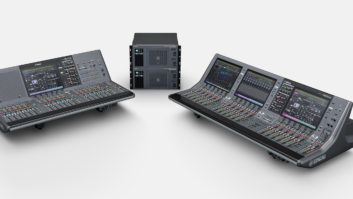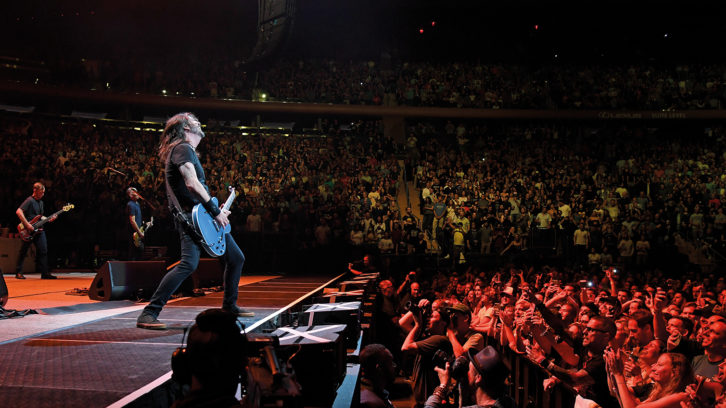
Photo: Kevin Mazur/Getty Images
New York, NY (July 6, 2021)—The phones started to ring at tour sound and lighting production companies during the second week of March, 2020 as clients called with the bad news: The truck was bringing the gear back to the warehouse; the tour had been canceled.
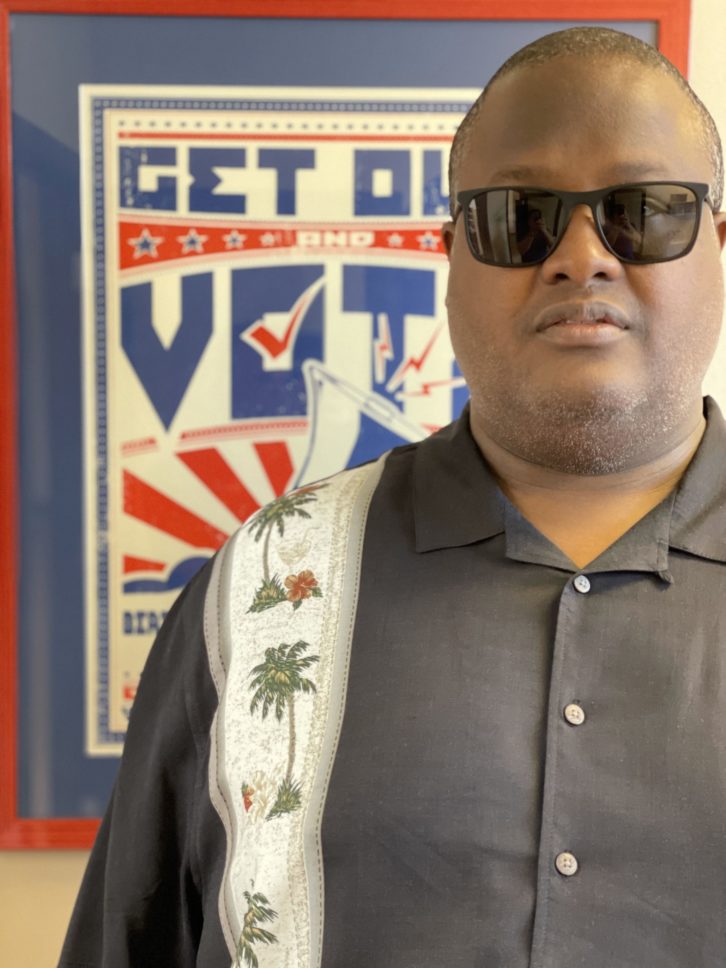
“2020 was going to be one of the best touring seasons that we’ve ever had,” says Brooke Porter, accounting and project specialist with Spectrum Sound in Nashville. “We had hired additional techs, purchased gear; we were really ramped up—and within a week, one tour after another was canceled.”
Few knew how to react to an unprecedented coronavirus pandemic that had put millions of people into lockdown with no end in sight, but the first priority for tour sound companies was to look after their employees. “By March 23, we were starting to make the furlough calls, with an expectation of everyone coming back to work by July,” says Sean Sturge, who handles global sales for Eighth Day Sound.
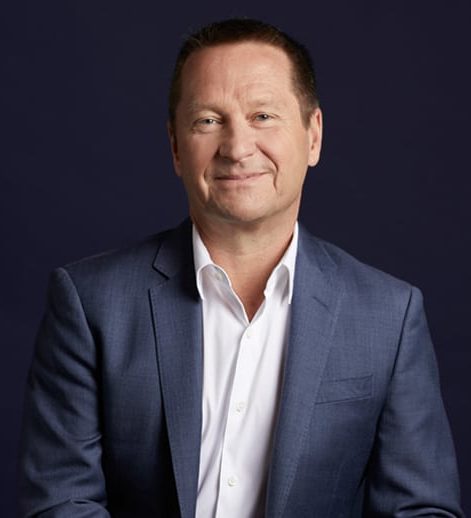
Like many in the industry, Sturge says, he kept an eye on Live Nation, a significant source of business—and they kept pushing back their reopening date: “July went to September, then September went to January first.” Some work continued through the pandemic, though, he says, it was primarily DiGiCo desks and IEM systems sent out regularly on video shoots with the likes of MelodyVR and XR Stages.
“It was really important to us to be able to keep as many employees as we could,” adds Porter. “We maintained their benefits, helped with unemployment, did as much as we could. We were very fortunate that we have other departments; our integrations department was not affected at all, and when the Fall came, there was a little bit of rental work,” including livestreaming events.
“We had to furlough a lot of people—probably 1,000 or more globally,” says Mickey Curbishley, president of Solotech’s U.S. rental division, “but we were in a fortunate position where 50 percent of our company is live production but the other half of the business deals with fixed installation. That business never slowed down. We managed to keep the company afloat; in fact, we’ll probably end up making a profit this year.”
KEEPING THE BUSINESS AFLOAT
As things started to shut down in Spring 2020, Howard Jones, CEO and founder of DCR Nashville, put a plan in place in case the pandemic dragged on. “Our team is the core of what we do,” he says. “Retaining the staff would be key when things resumed. With a couple of exceptions, we were able to do that.”
Phase two of DCR’s plan addressed cash preservation. Phase three was the unthinkable, which thankfully never happened, Jones says: addressing company preservation.
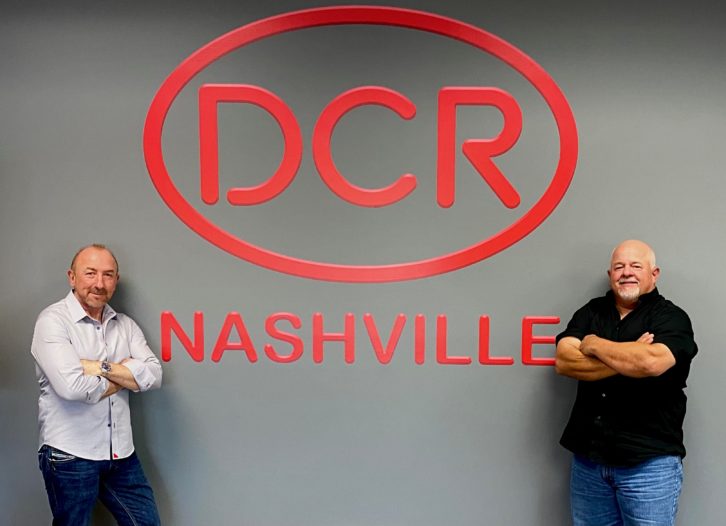
During the pandemic, he says, “Other than doing some minimal time in the shop de-prepping the gear that had returned, we shuttered the company, and everyone worked from home.” While some companies chased after virtual or drive-in shows, he says, DCR hit pause, only coming out of hibernation to participate in Nashville’s Red Alert events in support of the RESTART Act, which included relief funding for venues. “Our financial plan didn’t require us to go chasing those opportunities,” says Jones.
With every piece of gear heading home, warehouse space became an issue. “In an average year, we would have 64 systems anywhere and everywhere. We have over 1,300 d&b J boxes. I had no idea we had that much gear,” says Sturge, speaking of Eighth Day.
Ironically, there was a silver lining. In August 2020, tour sound giant Clair Global announced that it had acquired Eighth Day. “It worked out in our favor,” says Sturge. “We had all the equipment home, so we brought people back to do the barcoding and get everything into Clair’s inventory system.”
Paul “Pab” Boothroyd’s Wild Ride
DCR Nashville put expansion plans on hold during the hiatus. Now, as business returns, the company has unveiled a new space at its current address. “Transitioning into a new facility as we started to see the light at what we hope is the end of the tunnel made sense,” says Jones. The new, larger building offers increased warehouse capacity, a larger prep area and a newly designed service department.
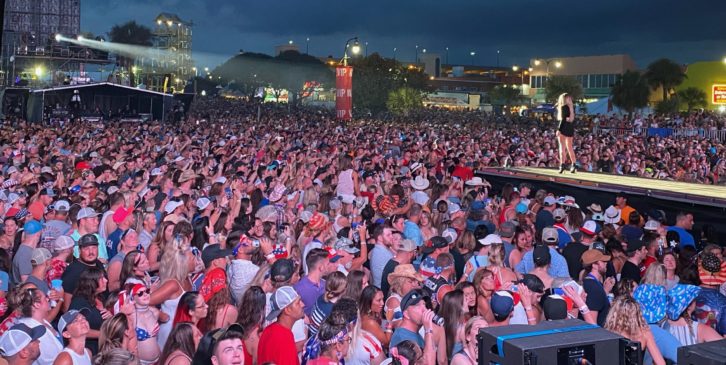
DCR Nashville has also made a significant addition to its workforce as things have started to open up, hiring industry veteran Paul Owen as company president. “Having been an owner at Thunder Audio, a company similar in size to DCR Nashville, and general manager at Solotech Nashville, with decades of experience and a great brand in himself, Paul has made a great fit,” says Jones. “To get that entrepreneurial mindset in the upper levels of the company is a huge plus for us and will help chart a path for growth as we come out the other side.”
The total shutdown last year was uncharted waters, says Owen, adding, “The focus then was on live broadcast of sporting events and streaming to utilize some of our assets and get staff working.”
At Solotech Nashville, he says, he reached out to his clients’ out-of-work staff and associates to see if he could help, little realizing that he would soon be joining them. “Having the offer to start afresh with DCR was not a hard decision to make,” he says, “especially considering how they had shown great integrity and support of their staff and the city during Covid. Those are qualities of a company I want to be part of.”
Solotech had signed a lease on the new 30,000-square-foot space in Nashville immediately pre-Covid, Curbishley reports, but withdrew as the lockdown took hold. Six months later, the company realized that opening a Nashville location was still the right decision. “So we’ve gone all-in and taken a 130,000-square-foot building,” he says.
Meanwhile, at the company’s other main U.S. base, in Las Vegas, Solotech is supporting upcoming shows by Carrie Underwood, Luke Bryan, Katy Perry and Celine Dion at the new Theatre at Resorts World in Las Vegas, where the first signs of a sustained live performance comeback started to appear a few months ago.
GEARING UP FOR THE COMEBACK

Every tour sound production company constantly cycles equipment through, acquiring new technology and retiring and selling off older gear. Spectrum Sound took the opportunity of the lull to cull its rental inventory. “We focused mostly on consoles and wireless,” Porter explains. “We replaced all of our DiGiCo SD10s with Quantum Q338s and 225s. That was popular; a lot of our clients have been asking for those.”
“We had an order to pick up 12 [DiGiCo] Q338s,” says Sturge, “but, of course, there was no revenue. At the end of 2019, we took an order of 300 d&b audiotechnik KSL8 speakers, so we have enough new inventory waiting to be used.” So far, he says, there are amphitheater tours on the books but relatively few in arenas, where normally he would see 30 to 40. That said, Green Day has a string of arena dates coming up with Fall Out Boy and Weezer on the Hella Mega tour. Meanwhile, festivals such as Firefly, Bonnaroo and Governors Ball have all been pushed back to September, he says, and other tours are delayed until 2022.
At DCR, Jones reports, “We made investments into expanding our inventory through the acquisition of equipment from other companies. That was a big help to us and the companies from which we purchased. We’re positioned nicely to take on the flood of work that is building in the industry,” he says, including regular clients Brantley Gilbert, Trace Adkins, Kane Brown, Ann Wilson, Tanya Tucker, Tyler Farr and Tracy Lawrence, who all hit the road in June.
“A lot of people sold equipment to survive,” says Curbishley, “We’re very good at rotating our equipment. If you can rent it then sell it strategically, and those combine well, then you’ll have success—so during Covid, we had a good cleanout,” finding buyers around the world. As for new gear, he says, “We bought a company, Morris Light and Sound, in Nashville. That came with a lot of equipment and a lot of great people.”
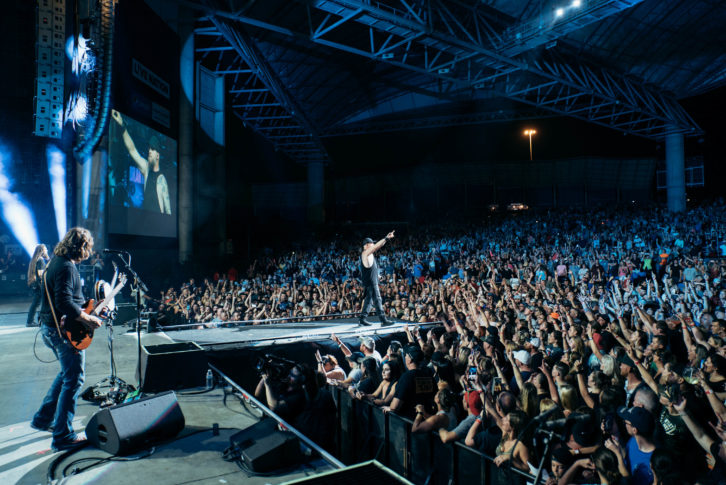
Now, though, there are supply chain issues— across many industries, not just pro audio—that are delaying the delivery of new items as the global economy struggles to get back up to speed in the face of shortages, from electronic chips to construction materials. “A lot of manufacturers don’t have stuff in stock, and lead times have tripled,” says Porter.
That has become a challenge in some parts of the country as states begin to reopen along different timelines and under differing conditions. Nashville has been open without restrictions for some time, and as a result, “We have dozens and dozens of clients, all out at the same time,” says Porter, reeling off a list of country and Christian music artists that Spectrum Sound is supplying: Thomas Rhett, Jason Aldean, Kelsea Ballerini, Old Dominion, Sam Hunt, Dustin Lynch, Mercy Me, Lauren Daigle and Zach Williams. “It’s been a huge challenge for our rentals department, trying to figure out how to get everyone’s needs fulfilled.”
CALLING BACK THE CREW
Many tour sound companies have maintained at least a skeleton crew at their warehouses during the pandemic. Some, like DCR Nashville, found ways to keep teams sharp during downtime. “John Schirmer, our general manager, and I challenged the staff to upgrade their skills with things like previsualization software, Vectorworks, and implementation of a new inventory management system,” says Jones. “We started ramping back up on our shop hours in March.” Now, he says, “We’re QC’ing everything and getting up to 100 percent and ready to reopen.”
During the hiatus, Eighth Day invited Solid State Logic to train tour sound crews in Australia and the U.S. for five weeks on the manufacturer’s Live consoles, says Sturge. “For the staff that was at home, we did two weeks of training on Zoom on Tuesdays and Thursdays for wireless and on d&b [speakers].”
Staff have been returning to Eighth Day’s facilities. “Since February 1, we’ve brought back four a week; we’re adding one a week now, because we’ve brought back so many. If you’re not touring, you can work in the warehouse,” says Sturge. “We have not forced mandatory vaccinations, but at least 90 percent of our staff have gotten vaccinated.”
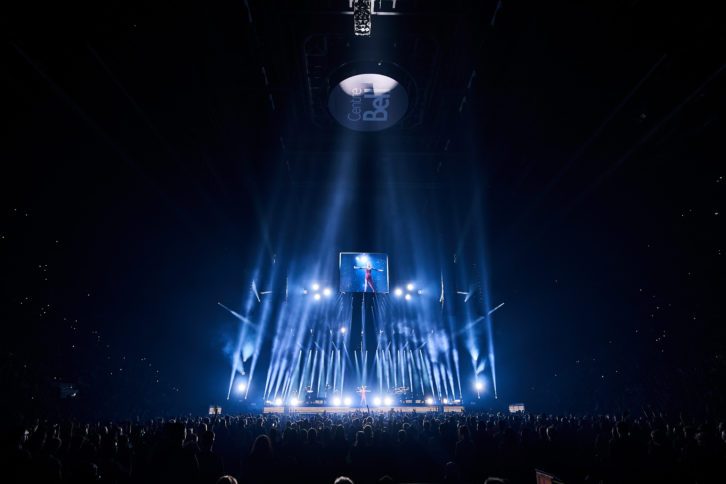
Over at Spectrum, Porter says, they, too, have taken advantage of available time and crew to prep for a busy return. “We’ve had to go through and test everything, like all of our RF,” she notes. “We’ve spent lots of time updating software and firmware on the consoles, turned everything on and burned it in, did cosmetic maintenance, repaired cases. We’ve been going for a few months in anticipation of where we are now.
“I would say our employment number is now about up to where it was before February of last year,” she adds. “We’ve been able to bring back pretty much everyone who wanted to come back. [Still] there were a couple of people who left the industry.”
“We were predicting that we would be back in business by September in the U.S. and it feels like we’re back in business already,” says Solotech’s Curbishley. “Most of the tours that were halted have managed to find new routing and are getting ready to go again.”
The tour sound industry now faces a people problem, he adds. “One of our biggest challenges is finding the people, getting them integrated and back up to speed.” Speaking in mid-June, he says, “I was on a call yesterday with 50 people from all around the world, senior production managers and company owners from Brit Row, Clair, PRG and Solotech, to talk about the fact that our crews haven’t done anything for a year and a half.”
Not only do tour sound crews need technology refresher courses, they also need to get back in shape. “Our crews are used to working 18-hour days, four or five days a week.” After the long layoff, says Curbishley, “they’re going to be exhausted on day two. That’s dangerous; that’s how accidents happen.”
The past 15 months were tough, but there’s plenty to be thankful for, says Spectrum Sound’s Porter. “Something like this reveals the importance of having a plan and having good forecasting and financial planning—and thank goodness the owners really wanted to take care of the employees.”
